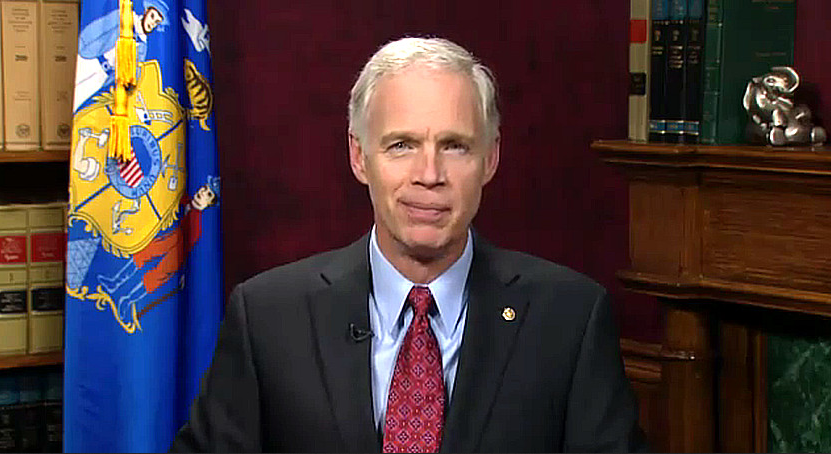
Sen. Ron Johnson (R–Wis.) spoke about the Federal Budget with Mike Gousha on Tuesday
A few weeks ago former US Senator, and well known progressive democrat, Russ Feingold appeared on "One the Issues" with Mike Gousha. On Tuesday the man who took Feingold's seat appeared on the same show. Ron Johnson is a Tea Party Caucus affiliate of the Republican party, and appeared with Mike Gousha to speak about the federal budget deficit and the economic trouble America is in.
Johnson, a prominent Oshkosh businessman before elected to the senate, campaigned on jobs and responsible economic spending practices. He spent the majority of his time arguing for his proposed approach to the budget deficit. He, presented a powerpoint laden with numbers that argued that President Obama has been a failure as a leader in tough economic times.
He argued that 75% of our $16 trillion national debt was created by Obama and irresponsible democrats during the president's first term. Johnson also argues the Affordable Care Act, which mandates that every person be covered health insurance and completes this country's social safety net, will increase the national debt exponentially over the next 20 years.
The Senator's proposal is that we curb spending immediately and cut taxes for everyone in great rates t grow the economy. He pointed to the Reagan tax cuts and the economic boom of the 1990s as evidence that this would stimulate the economy. He argued that increased economic growth, rather than wealth redistribution, would be better for the country, specifically for the middle class.
Johnson has been criticized for his policies. Having no training as an economist many have argued that he is unprepared to make specific economic statements, pointing out that being a businessman is different from fixing a national economy. To be fair to Johnson however, he was a highly successful businessman
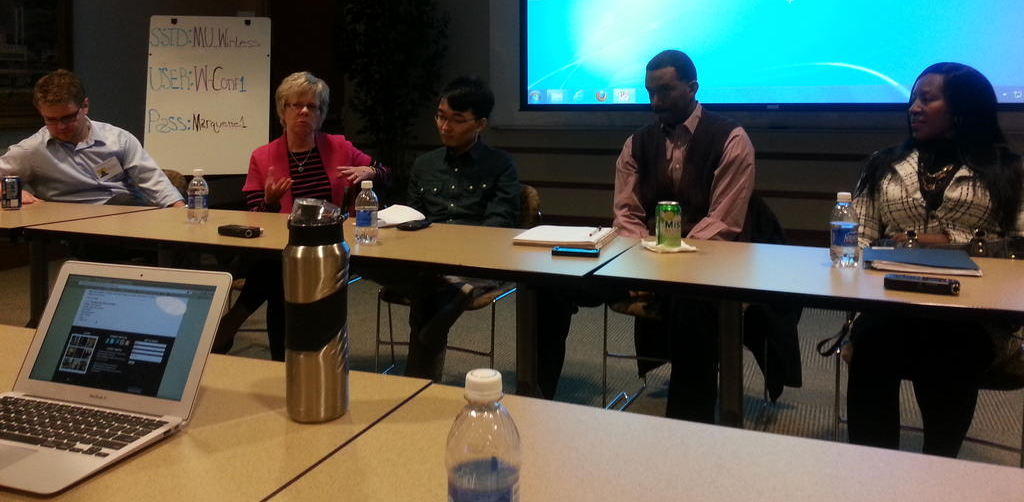
The Panelists for the Nieman round table on New Media and Politics
On Tuesday Oct. 19 a panel of experts ended Marquette's Nieman Conferences by gathering to discuss how "New Media" affects the election, and electoral issues in modern times. The panel focused much of their attention on Twitter and Facebook and how these two social media giants influence campaign coverage.
The panel, moderated by Nieman professor of journalism Bonnie Brennan, was composed of Chioma Uguchukwu, assistant dean of the Diedrich college of communication, Joyce Wolburg, associate dean and professor of advertising, Herbert Lowe, journalism professional-in-residence, teaching assistant Arthur Thomas, and research assistant Hang Lu. All of the panelists are notable for their prolific use of social media.
One of the many topics discussed was the difference between how voters and campaigns utilize social media in the realm of elections. It is no secret that the internet, and Twitter and Facebook in particular, presents an infinite ability to communicate with those who are not normally in your sphere of influence. Campaigns take great advantage of this fact. Every candidate in every election has a Twitter account these days that they use to connect with voters. The grand failure of this is that not every candidate is doing their own tweeting. It is noticeable when a tweet was crafted and sent by an intern, which takes away from the sincerity of the message to an extent.
Voters, for their part, use Twitter in a far different way. They use it as a forum for political discussion with each other. The increased connectivity presented by Twitter allows voters to engage and debate the issues that matter most to them. Unfortunately this almost never happens in a meaningful way. Online debate between people with conflicting views is not often amicable, to say the least. What happens more often than not is people will unfollow, unfriend and block users with conflicting opinions. This constant act leaves our views unchallenged, never advancing the national debate and forcing two sides increasingly further apart.
Another topic that came up was the use of data mining by websites and political campaigns for use of targeting voters. Members of the panel seemed to view this act as an invasion of privacy, believing that what you post on your private Facebook page should not be sold to advertisers and politicians. This view is grossly misinformed. The internet is not a private forum for use, but rather an open stream of information. If you would not feel comfortable yelling personal information and opinions on a crowded city street then you should not feel comfortable posting it online, because the two are the same. If you would not be upset with a friend trying to talk to you about something they knew you would be interested in or trying to sell you something they knew you would buy, then you can not find objection with it being done on the internet.
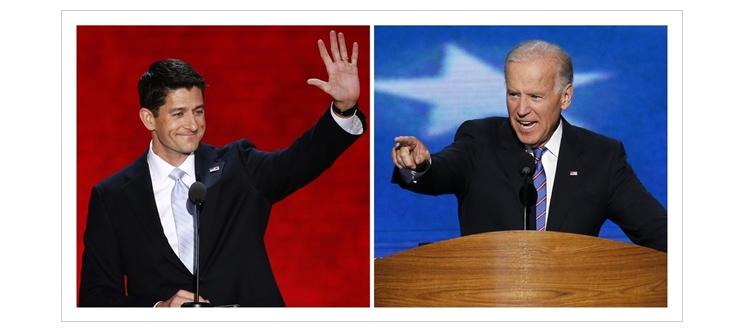
Rep. Paul Ryan (R-Wisc) and Vice President Joe Biden will square off Thurs. Oct., 11.
The past week has been a tumultuous one for the incumbent Democratic ticket for the office of the White House. It all started with Barack Obama's poor showing against Mitt Romney in the first POTUS debate last week. Since then, Romney has made significant gains in key wing states according to the latest NBC/WSJ/Marist poll. All of this adds to the pressure on Vice President Joe Biden to perform Tomorrow night in Kentucky. The match-up is an interesting one. Even though Ryan is an experienced congressman, this will be the first debate on a truly national stage for the wonky Wisc. GOP superstar. Even though he lacks experience, Ryan is admittedly confidant. Biden on the other hand is an experienced debater. Considered to be somewhat of a "bulldog" in political circles, he is willing to do do battle with anyone, anywhere. And his personality isn't one to sit back and take attacks from his opponent like Obama did in his first contest with Romney. If Ryan goes after him and the president, you can believe the "Delaware Dandy" will hit back. One thing that could spell Biden's undoing is his penchant for well timed gaffes. Interestingly enough, there are some great similarities between the two candidates. Both came into the congress at very young ages, Biden being elected to the Senate at 29, and Ryan to the House at 28. Both have a history of strong leadership in their respective branch of the Legislature. Both have a near cult-like fanatical support in their home districts, Wisc.'s 1st for Ryan and Delaware – notably Wilmington, Del. – for Biden. Of course there are glaring differences for between the two candidates as well. The biggest being in political style. Ryan is a numbers guy. Bottom line, brass tax is what matters for him. Biden on the other hand is a natural politician who's wheelhouse is on the baby-kissing circuit. This contrast in personalities and clash of strong wills will lead to an excellent contest on Thurs. night. As far as media coverageof the debate, NBCNews.com has done an excellent job of preparing readers for the debate. There have been articles on the front page all week, offering insight and analysis into what could go down in Ky. Unfortunately there were only articles, which is never really a problem but it would be nice to see some more varied media in the coverage.
On Thursday, former Senator and Marquette Law School professor Russ Feingold appeared at Eckstein Hall for " On the Issues, with Mike Gousha." The law-minded liberal statesman from Wisconsin is now running a political action committee called Progressives United, which focuses on preventing further corporate influence on elections. The topics of the day seemed to narrow in on two things: US foreign policy, and the Citizens United ruling from 2010. Oh, and the president's performance in the previous night's debate was a hot topic as well. Of course it was. A discussion in the heat of election season between to politically inclined individuals to a room full of (presumably) intelligent people had to cover an even as important as the presidential debate. That conversation went as expected. Gousha asked about the president's poor performance and Feingold, ever the Democrat, managed to spin it in Obama's favor. Defending Obama by saying things like "He was staying above the frey," Feingold turned to attack Romney's economic policies. To be fair, though, Feingold was tough on Obama's on stage demeanor, questioning weather or not he should have spent so much time studying the grain in his podium. More interesting was Feingold's criticism of US foreign policy. As a former member of the US Senate committee on foreign relations, and the chair of the Subcommittee on African Affairs, Feingold is one of the most well versed in the intricate details of foreign policy. He said that he believes that both sides are politicizing the attacks on US embassies abroad, rather than having real discussions about the topic. He also spoke for some time on the US Drone programs, warning of the dangers of unmanned drone strikes, and the legal ramifications of declaring somebody guilty of crimes against the US without a proper trial. The topic that Feingold spoke most passionately on was Citizens United. As many of you remember, Citizens United v. Federal Election Commission was a landmark case in which the US supreme court ruled that corporations could not be limited in the money they spend on campaigns. Feingold now leads a pac against this rulling, believing that it was a travesty to the law ad can only lead to coruption on both sides of the aisle. It was a great event. I have been to a few of these "On the Issues" and have never been disappointed. It will be interesting to see what the next one has in store. I will be attending the event featuring US Senator Ron Johnson on the 23rd, expieriencing vies opposite those of Feingold. Johnson is the man who took Feingold's senate seat in 2010 as an affiliate of the Tea Party. It will be interesting to hear Johnson's views on the same subjects talked about Thursday. They will certainly put the former Senator's in perspective.
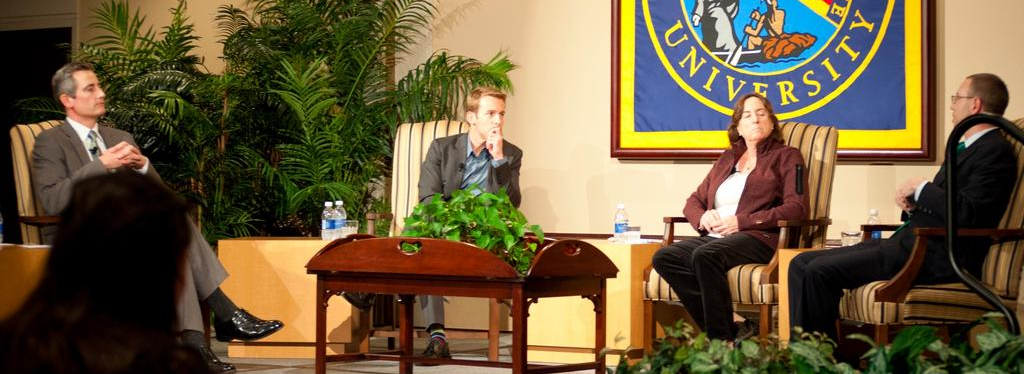
Left to right, Eric Ugland moderates the discussion with Ben Tracy, Bonnie Brennan, and Christopher Murray. Photo by Alex Rydin
The Diederich College of Communications and the Les Aspin Center for Government hosted a panel discussion on how mass media is covering the campaigns. This created the perfect opportunity to get out of the classroom and see what other journalists' opinions on the subject are.
The discussion focused primarily on the quality of news coverage in the "22 minutes" a network gets for evening news. Between feel-good human interest stories, sports and world events, there simply isn't enough time to keep the electorate properly informed, which I have argued before is the primary responsibility of fourth estate.
Dr. Brennan, a Nieman Professor of Journalism in the Diederich college, was correct when she made this statement. It is impossible to do your job as a journalist when you only have a few minutes. That is why everyone on the panel argued for a wider range of media consumption by the information consuming public. And with a wider range of media consumption comes the opportunity to cover issues that are less discussed on nightly television news.
Both Dr. Brennan and Ben Tracy, a 5 time Emmy winning CBS National News correspondent, agreed that superpac money has negatively influenced the electoral process. While this is something most people will agree on, its not something that seems to get a lot of media coverage. likely because it is a comparatively boring topic. The average media consumer doesn't want to read or watch or listen to a piece on the ethical and legal implications of allowing large groups of rich men donate exorbitant sums of money to political candidates. But this is something that needs o be covered more often.
Overall I did not like the event. I did not think they delved deep enough into the issues revolving around the media coverage of an election. Instead they briefly mentioned several topics that were on everyone's mind and moved on to questions. I don't mean to stick it to Mr. Ugland, the moderator, but he probably should have had the discussion moving in a more focused direction.
|



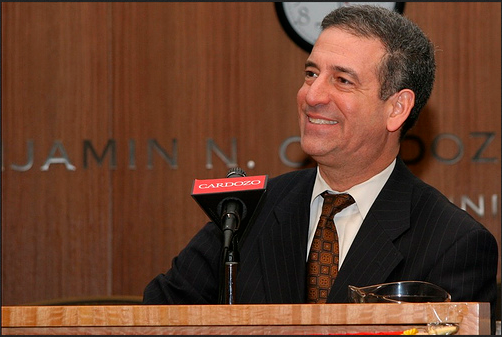

 RSS Feed
RSS Feed